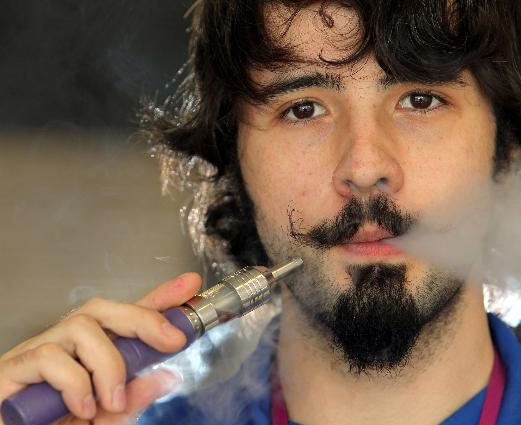FDA: cigarette of the future could be non-addictive
By Deborah Kotz | GLOBE STAFF
The US Food and Drug Administration submitted plans several weeks ago to increase regulation of tobacco products including chewing tobacco, cigars, and likely electronic cigarettes — which produce a nicotine vapor that’s inhaled. While the agency hasn’t announced what those restrictions will be — since they’re being reviewed by the White House budget office — Mitch Zeller, the director for the FDA Center for Tobacco Products, sat down for an interview Monday to discuss efforts to help people stop smoking and to keep kids from starting in the first place.
Here’s a run-down of some of the things on his agenda, with a few wrinkles that still need to be ironed out.
1. Create a non-addictive cigarette. We have the authority given to us by Congress to reduce nicotine in cigarettes down to nearly zero,” Zeller said. Since nicotine is the addictive chemical in cigarettes, teens who start smoking products that are almost nicotine-free could, in theory, never get hooked in the first place. Researchers now have access to 9 million cigarettes with varying amounts of nicotine to start testing whether products with lower amounts will lead to less addiction among new smokers. But don’t expect an ultra-low-nicotine product for at least a few years, Zeller added, since the studies are just beginning.
The wrinkle: Smokers already hooked on nicotine might find the new products seriously lacking, and they might need better nicotine replacement products than those currently on the market to help them overcome their cravings.
2. Run ads to scare teens away from smoking. Teens may think they already know about the dangers of smoking, but that doesn’t prevent 3,000 12- to 17-year-olds every day from lighting up for the first time. The FDA is planning an ad campaign for early next that is intended to make the thought of smoking turn teens’ stomachs. Expect, Zeller hinted, to see an anti-glamour campaign: ugly photos of smokers with rotting yellow teeth, wrinkles, and tar-stained fingernails.
The wrinkle: Teens still see their favorite movie stars — yes, you, Nicole Kidman, and you, Jennifer Aniston — glamourously smoking in photos and on the silver screen, so it may be tough for a government public safety announcement to effectively counter those influences.
3. Loosen warning labels on nicotine-replacement products. Zeller said the FDA might want to consider loosening the labeling on over-the-counter nicotine patches and gum, which currently state that users should not use them for longer than 8 to 12 weeks without consulting a doctor. “We need to look at how other Westernized nations, like Great Britain, are looking at nicotine,” he said. Other countries take the tack that smokers may always be addicted to nicotine and may need to be on some replacement product for life — which is far safer for them than continuing to inhale cancer-causing chemicals in tobacco.
The wrinkle: The FDA hasn’t determined how e-cigarettes should fit into the array of smoking-cessation products. Some smokers have told Zeller that the battery-operated devices are the only things that work to get them to stop smoking tar-filled cigarettes. But scant research has been done on the products to determine first, whether the vapor they release is safe to inhale, and second, whether e-cigarettes deliver the same quick nicotine rush to the brain that smokers seek. Those nicotine bursts aren’t delivered by FDA-approved nicotine replacement products.
4. Ramp up enforcement. The FDA has been making vigorous efforts to crack down on retailers who are selling cigarettes to minors. More than 10,000 stores throughout the U.S. have received warning letters since 2010, Zeller said, after minors serving as undercover agents were able to purchase cigarettes without an ID check. Hundreds of stores in Massachusetts were also warned that they would be fined if they didn’t change their practices.
The wrinkle: It’s tough to know how well the efforts have worked. The decline in smoking rates among teens has largely leveled off and many are still getting their hands on tobacco products.
http://www.bostonglobe.com/lifestyle/health-wellness/2013/11/05/fda-cigarette-future-could-non-addictive/sEZZVH2vR9JJ6OKviItX4J/story.html

